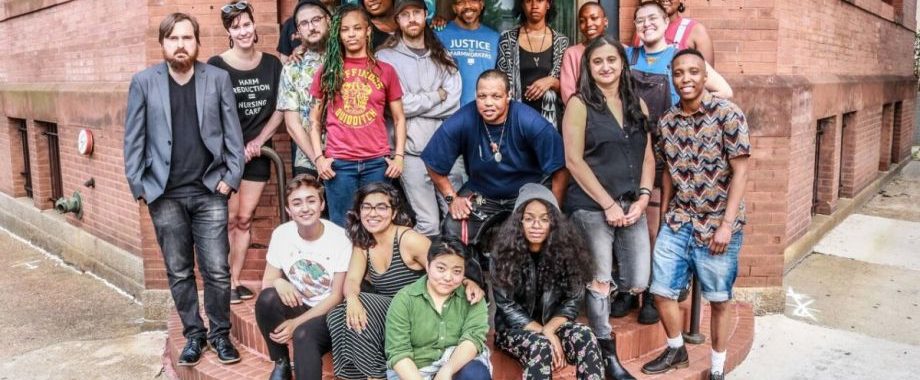Category Archives: Blog – CH General
“Local Businesses Embrace a Worker-Owned Cooperative Model They Say Could Transform the Humboldt Economy” – Lost Coast Outpost, 7/31/2020
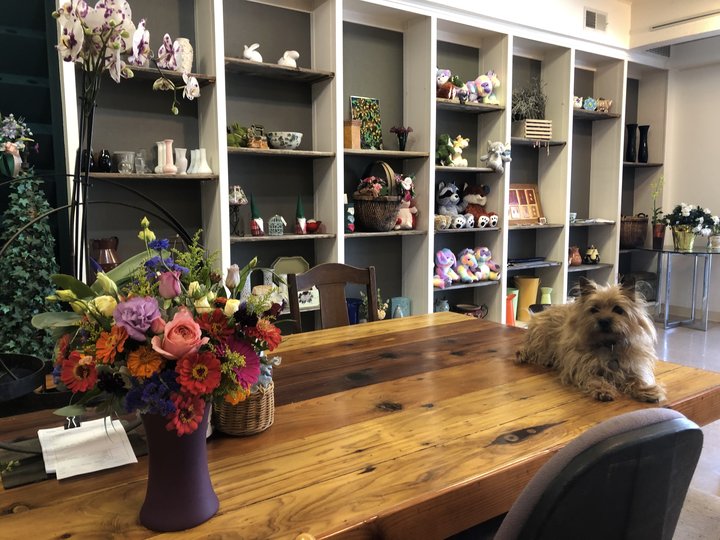
Pippin the shop dog sits atop the meeting table inside Eureka Florist. | Photo by Ryan Burns.
###
Finn Ferguson never really wanted to be a business owner.
“I was not a big fan of being the person in charge,” she told the Outpost in a phone conversation on Monday. But sometimes preparation meets opportunity in unexpected ways.
Ferguson and her friend Gwen Price recently took over Eureka Florist, a 90-year-old flower shop in Henderson Center. And while they’re facing some challenges familiar to all new business owners (plus a host of others caused by COVID-19), Ferguson and Price don’t plan to operate their shop like a traditional business — with a boss who hires employees to work for an hourly wage. Instead, they’ll run it as a worker-owned cooperative, meaning everyone involved will be a co-owner with an equal stake in the venture’s success or failure and an equal voice in its management.
Ferguson learned about this alternative business model via Cooperation Humboldt, a nonprofit that aims to make the local economy more equitable and sustainable through an array of community-focused endeavors, from “Little Free Pantries” that stock food for hungry residents to a skill-share network, workshops and study groups critiquing capitalism, patriarchy and white supremacy.
Feminist Leadership and the Co-owner Mindset for Worker Owned Cooperatives
“From each according to [their] ability, to each according to [their] needs.”
As children most of us tend to either accept the authority of our primary care providers or reject it – rarely do children have the opportunity to exercise autonomy or true collaboration with adults. It’s the same in school: the teacher is the authority and we are required to do as we are told, even when we are collaborating with our peers. As adults we become the parents and the teachers, exercising our authority over children, continuing the cycle of power-over indoctrination. When we enter the workforce, we either become employees or employers – we either hold ultimate financial and governance authority, or we obey that authority.
Most of us have little experience with non-hierarchical, collaborative power-with cooperation with a group of our peers. When we decide to start a worker owned cooperative, we like the idea, we study the idea, but we have very little experience putting it into practice. Our deeply ingrained power-over habits tend to take over in times of stress. Since owning and running a business is often stressful, that means our deeply ingrained power-over habits often take charge. We revert to what we know best.
Power-over behaviors often manifest as:
- Raising our voices, speaking rapidly, speaking a lot
- Pushing our ideas forward without hearing others
- Displaying negative emotions to make others uncomfortable so they will capitulate
- Passive and passive aggressive language
- Turning away from essential communication
- Getting frustrated with what we perceive as the inadequacies of others
- Complaining to others about what we perceive as the inadequacies of others
- Forming cliques and group divisions
- Taking over someone’s task just to get the job done
- Dropping the ball or quitting because it isn’t worth our time and effort any more
In order to counteract our tendency to revert to these and other power-over behaviors, it is essential that co-op owners learn and use a democratic process for task management, communication, decision-making, and accountability. This should not be an informal process – it should be intentional and deliberate. When selecting our frameworks for cooperation, we do not expect to succeed immediately. Working with a method of cooperation is the consistent and ongoing exercise of “failing forward.”
Failing forward is about leveraging and learning from mistakes. It is about making a realistic assessment of risks and learning to live with the downside and experiment with new approaches. Failing forward is an investment in human success. It is not only necessary, it is essential. Because we will fail. The question is what we do after a failure. When communication breaks down, when power struggles emerge, instead of reverting to our deeply ingrained power-over instincts, we look to our framework and our mentors for guidance.
Initial inspiration for a new idea or project often comes from one person. Someone thinks, “I want to start a worker owned cooperative,” and then they set out to do just that. They research their idea, they sign up for classes, they begin to gather a group of similarly interested people. In many cases, the person who does this initial work is a person who is used to taking a leadership position. Perhaps they are an older sibling; perhaps they cared for their parents or lived on their own. Perhaps they were consistently put in a leadership position because of the structures of white supremacy; perhaps they have money. Perhaps they are just that kind of person. There are many reasons why some of us end up in leadership positions. No matter what the reason, almost all of us were raised in a culture that puts that kind of person in power-over relationships. Cooperative groups do this unless we learn new systems and processes. Some of us will accidentally slip into positions of leadership and some into positions of subordination.
For those of us who find ourselves in leadership positions within our groups, it is our responsibility to use that power to redirect the group’s attention back to the fundamental cooperative structure, and to constantly look for opportunities to divest ourselves of our power-over position and shift to power-with. Some of us will be more comfortable and capable of understanding the cooperative structure and holding ourselves accountable within that structure. It is our responsibility to act as mentors, and to find teachable moments to offer pathways for redirection. It is challenging to accomplish this without falling into a power-over position, telling others what they should and shouldn’t do.
One of the simplest and most effective tools we can use is a question rather than a statement or a command. “Would anyone like to take on the task of improving our meeting facilitation so that I’m not always the one taking the lead?”
For those of us who find ourselves subordinate to others in the group – either by choice, by accident, or because others in the group have fallen into power-over behaviors – it is our responsibility to share our experiences directly with the group. Ideally, we communicate our experiences as they are happening. The practice of Non-violent Communication (NVC) is an excellent tool to learn to do this. Groups that choose to study and practice NVC together are more likely to recognize what is happening and be prepared to actively listen when someone in the group shares how they are feeling and why. “When you just raised your voice, I felt uncomfortable. I stopped listening and became defensive. Will you please use a different tone of voice so that I can better hear what you are saying?” To accomplish this kind of effective communication, we must study, practice, and fail forward, again and again.
Another reason that we find ourselves in subordinate positions has to do with accountability. If a person isn’t accomplishing their tasks in a timely or effective manner, the group will naturally contract around those who are, shifting the balance of power in order to keep things moving along. Because of our deeply ingrained capitalist mindset, we may respond to that lack of follow-through by unconsciously assuming a sense of superiority. For those of us who find ourselves taking on more responsibility when others are falling short, we can practice asking, “Why is this person not showing up? How can I help?” rather than saying, “This person isn’t showing up, so now I have to do their job, and I resent that.”
Assume good intent. Recognize that energy fluctuates, circumstances fluctuate, and everyone is always learning. Cooperation and equity do not mean stability and equality, they mean flexibility and mutualism. It is healthy for us to take the burden from our comrades when they are tired.
When we are the ones dropping the ball, we can ask ourselves, “What kind of support do I need right now?” The idea that a person must maintain maximum productivity at all times without faltering or fluctuating is an extractive capitalist mindset that has no place in a regenerative feminist economy. Of course, if a person shows no signs of taking care of themselves or others, then eventually they will so blatantly violate the agreements of the co-op that a well designed governance and accountability structure will provide the pathway for their movement out of the group. But not before the group nourishes, heals, and supports that person as best we can.
Those of us who tend to find ourselves in leadership positions have the responsibility to empower, mentor, and support those of us who find ourselves more frequently subordinating to others. But our mentorship is not accomplished by delegating responsibilities, telling others how they can improve, or directly or indirectly punishing or rewarding others with blame, praise, and social capital. That’s how parents, teachers, and employers do it in patriarchal systems. Instead, we nurture everyone in the group. We are a garden. Before we bear fruit, we must sprout and grow. Then, we will cycle down. We need different things at different times. The process of mentoring a person who has not had many opportunities for leadership is a slow dance of offering resources and opportunities, and stepping back to let nature do what nature does best.
Those of us who tend to find ourselves in subordinate positions have the responsibility to resist the structures of patriarchy, white supremacy, capitalism, and colonialism that have taken our bodies and our minds as resources to be extracted. When we see those forces at play within ourselves and our cooperative members, our work is to look deeper into the heart and soul of everyone involved, and to heal the wounds inflicted upon our people, by our people, for generation upon generation. When we do so we will heal ourselves and each other, and develop the strength to step up and take co-ownership. When for our whole lives our value is measured by what we produce, while at the same time the value of what we produce is taken from us, our healing is to discover the inherent value of all people and resources, and then to treat all people as precious, starting with ourselves.
When we see ourselves as co-owners and we have the space, support, and capacity to act as co-owners, we don’t just think about our own needs and our own responsibilities. We see the interconnectedness of all living things, and begin to see our proper place within that interconnectedness.
Because we are so used to compartmentalized work environments with tasks assigned to us by others, it takes some time to adopt an ownership perspective. In practice, being a worker-owner means being able to accomplish direct, important tasks on the ground-level (worker) and to walk up the mountain and look over the whole ecosystem to see our broader relationships (owner). If we find ourselves stuck in one perspective or another – either bogged down in the details, micromanaging others, or up with our heads in the clouds of fantasy and idealism – then it’s time to take a walk, either up the mountain, or down into the valley. No worker-owner is going to be in both places at once, but over time we can develop trust that no matter where our comrades are, they are taking care of us all, and needing the care of us all.
Turn a laundry basket into a strawberry planter!
If you have a spare plastic laundry basket/hamper sitting around somewhere, why not put it to good use and grow strawberries in it? Here’s one way you can do that, though of course many variations are possible.
You’ll need –
- laundry basket/hamper
- soil
- plastic trash bag, burlap, or weed mat
- strawberry starts (look for small ones without a lot of greenery yet, or bare root)
- other plants for the top (optional; you can also just plant more strawberries there)
- scissors
The first step is to add some drainage holes to the bottom of your basket. We used a drill, but if you don’t have one, you could cut some slits with a razor blade, scissors, etc.
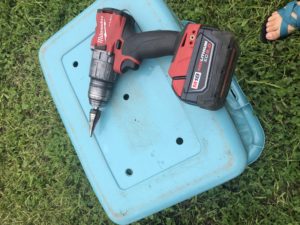
Next, position your plastic trash bag inside to keep the soil from falling out of the holes in the basket. (Alternately, you could use burlap or weed mat, in which case you’d just line the sides, no need to line the bottom.) We cut holes in the bottom of the plastic bag that lined up with the holes drilled in the bottom of the basket.

Then you’ll need to add about six inches of soil to the bottom of the basket.

Now you’re ready to place the first round of strawberries. You can place them about six inches apart around the perimeter at the soil level. Just poke a hole into your lining material (plastic/burlap/weed mat) at each spot where you’re going to place a strawberry plant, and carefully place the plant with roots inside and foliage outside in each opening.

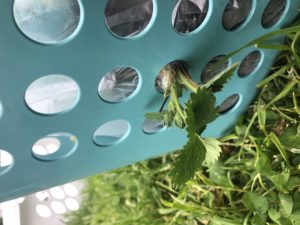
Add another 3-4″ of soil and repeat the process of planting, staggering this row of plants from the first row. Continue until you near the top of the planter. You can finish the project by planting more strawberries on top, or another crop like lettuce, kale, etc. Trim the liner material an inch or so above the soil line.
A note about watering – especially if you’re using a tall laundry basket/hamper, you might want to consider including a way for water to reach the center/bottom of the planter better. One way to do this would be to use a 2 liter soda bottle, cut off the bottom, take off the lid, poke several holes in the sides, and sink it upside-down into the top of the planter until the cut-off base sits right above the soil line. When it’s time to water, add water into this reservoir to encourage it to make its way all the way down to the center and bottom of the planter, ensuring that water reaches the roots of the lower plants, not just those on top. (We didn’t have any large soda bottles so we used the base of a plastic mango container from Costco… something longer and skinnier definitely would have worked better though.) You could also accomplish this by using a length of PVC pipe with holes drilled into it.
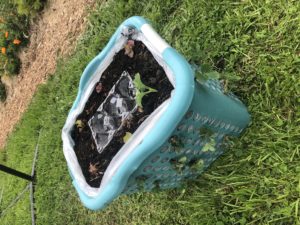
Here’s the finished planter, with about two dozen strawberry plants around the sides, and lettuce and kale on top.
If you attempt this project, please let us know how it goes!
Connecting during COVID
Greetings,
We hope you are as safe and secure as possible during this time of crisis. If you have any needs that we might help with, please visit the Cooperation Humboldt COVID-19 Community Response Needs Request page.
For those of you in a position to volunteer during this time, we have several specific invitations to collaborate and/or engage with Cooperation Humboldt and our COVID response activities.
Mini Gardens
Our food team’s primary focus this season is installing as many mini-gardens as possible for low income residents of Humboldt County. This project is just ramping up, and we’ve installed 18 so far, with almost a hundred more households requesting this service to date. We have a great need for garden installation volunteers – folks who have at least some gardening experience, and who can work semi-independently to deliver and install small (3′ square) garden beds and fill them with soil and plants. Volunteers can take on as few or as many gardens as they like, and of course Cooperation Humboldt will cover all costs.
If you’d like to help, but are unable to be an installer, we also welcome help in any of the following ways:
- Donate plant starts (we’re focusing on crops that are easy for beginners to grow, including lettuce, kale, strawberries, snap peas, cherry tomatoes, etc.)
- Build planter boxes
- Loan a truck for an installation volunteer who doesn’t have one
To learn more about how you can get involved with this effort, contact Tamara at tamara.mcfarland@cooperati
Little Free Pantries
During this pandemic, our Little Free Pantries are being utilized like never before. If you want to help with that project, contact Casey Jo at pheonyx31@gmail.com. And of course, you’re invited to donate non-perishable food and personal care items to any pantry, any time.
COVID Response – Eureka
We are also looking for someone able to take an active role in assisting our COVID response in Eureka. This involves helping to match needs requests with volunteers. If you are interested in learning more, contact David at david.cobb@
Mask Making
Want to join our mask-making team? Have materials to donate? You can sew from home, or come to our physically distanced office space in Bayside (which is sanitized before/after each use) and use a donated sewing machine. Contact Kait at kaitangus@gmail.com.
Learn/Engage
Curious about Solidarity, but isolated? Join us for a video conversation about the concept of Solidarity Economics generally, how Cooperation Humboldt applies those concepts in tangible ways locally, and how you can get involved – next Wednesday, May 6th at 2:00 pm on Zoom. Advance registration is required – click here to register. After registering, you will receive a confirmation email containing information about joining the meeting.
